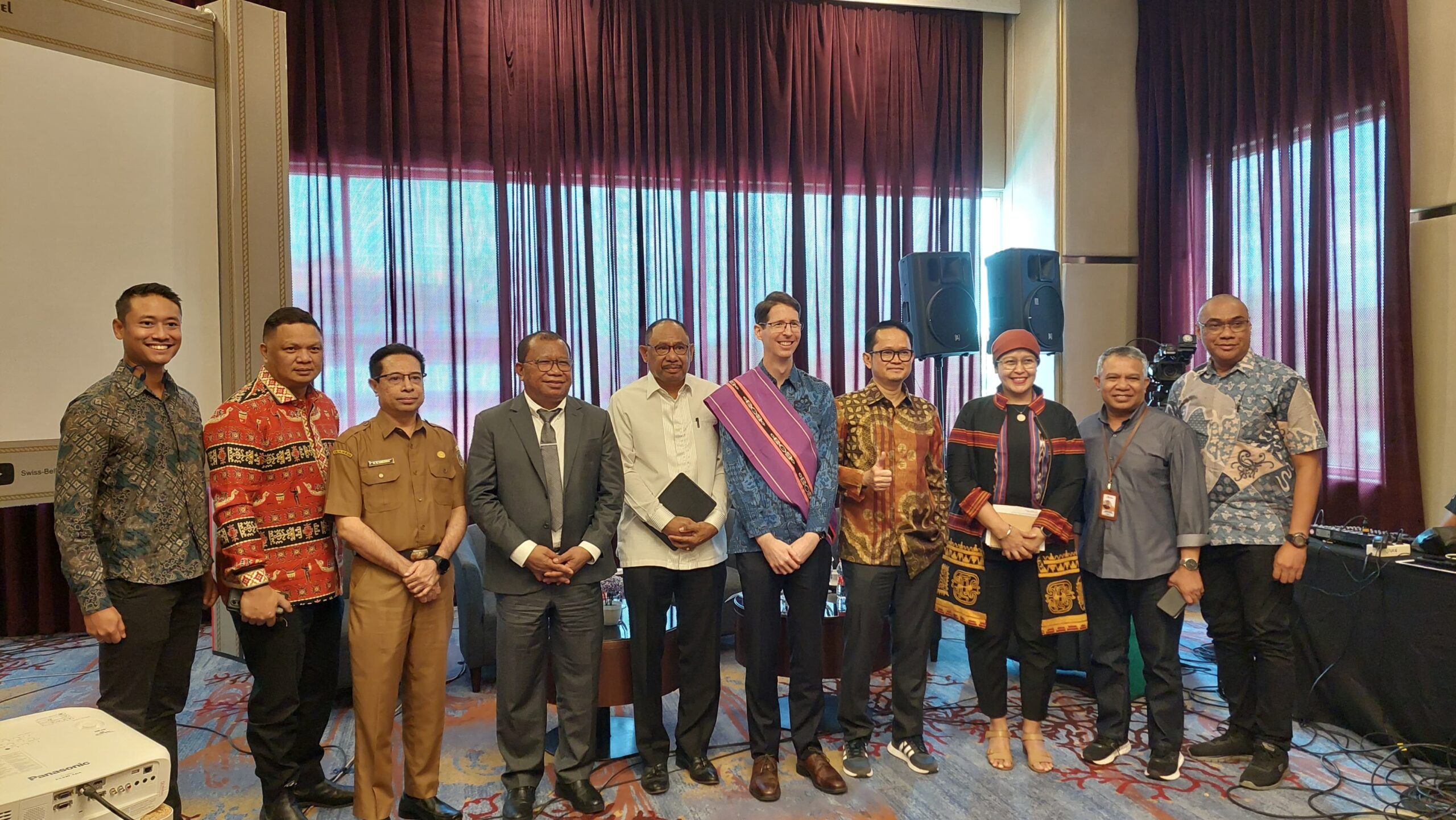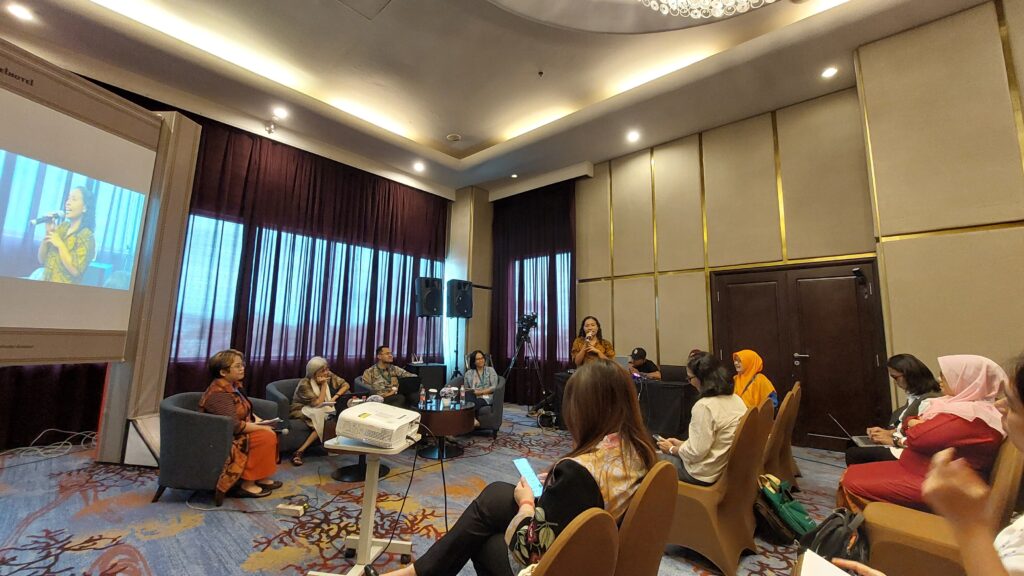Bridging academics, society and government: The 19th IRSA Conference in Ambon, Maluku

The 19th Indonesia Regional Science Association (IRSA) International Conference welcomed academics, researchers, policymakers, development partners and civil society representatives to Ambon on 15-16 July 2024. Co-hosted by IRSA and Pattimura University’s (UnPatti) Faculty of Agriculture (FAPERTA) and Magister Agribusiness Postgraduate Program, the conference focused on “Gender Inequality and Climate Change Impacts in Archipelagic Regions.”
IRSA has established an extensive network over the years, linking academics and policymakers to address regional development issues. This network now informs both research and the creation of evidence-based development policies at national and subnational levels. The conference sought to facilitate open discussions, knowledge transfer, strategies for policy formulation, and networking among scholars and policymakers. It featured a series of plenary and parallel sessions on multiple topics. Attendees included Master’s and Doctoral students, as well as academic and development professionals from Indonesia, Japan, Thailand, the Philippines, the Netherlands, Australia, and the United States all converging to share and discuss their latest research findings.
SKALA’s Partnership with IRSA
The Australia-Indonesia Partnership SKALA Program worked with the IRSA organizing committee to host a series of panel discussions on (i) using data for governance, (ii) the provision of inclusive basic services, and (iii) public funding management.
Data for Governance: Navigating Challenges and Opportunities in Maluku
Maliki, Deputy for Population and Employment at the Ministry of National Development Planning/Bappenas discussed Indonesia’s Socioeconomic Registry (Regsosek), a database aimed at enhancing public service delivery nationwide. He emphasized that accurate and comprehensive data on the entire population is essential for effective governance and service delivery by both public and private sectors. He also stressed the need for cross-sector collaboration to build a more resilient and responsive data ecosystem, underscoring that local governments need to be able to update and validate their data, while ensuring personal data security and enhancing inter-sector coordination.
Fredy Leiwakabessy, Rector of Pattimura University, emphasized the role of accurate data in supporting local development and regional research, arguing that sound data evaluation can enhance the quality of local government decisions and strategic planning. Astrid Kartika, Unit Manager, Department of Foreign Affairs and Trade (DFAT), Australian Embassy Jakarta, highlighted collaborative initiatives between Australia and Indonesia, such as the SKALA program, that aim to address these challenges and ensure that data serves as a reliable basis for decision-making in Indonesia.
Collaborative Pathways: Fostering Multi-Stakeholder Synergy for Inclusive Basic Service Delivery
Panelists noted that the Indonesian government is currently developing a National Action Plan strategy for vulnerable groups. Dinar Dana Kharisma, a Senior Policy Planner from the Directorate of Poverty Reduction and Community Empowerment (PKPM), Bappenas highlighted that the Ministry is focusing on mobilizing civil society to advocate for inclusive basic services at the regional level. He pointed to the disparity in access to healthcare and education between disabled and non-disabled individuals and emphasized the need for more inclusive and responsive policies, planning, and budgeting for individuals with disabilities.
Lies Marantika, a Senior Activist for Gender Equality and Social Inclusion from Gasira Maluku, called for stronger collaboration among all parties to advocate for gender equality. She stressed the need to identify and involve committed stakeholders in supporting women’s interests. Lies hoped that civil society initiatives in Maluku would continue to engage key stakeholders to build a more inclusive and just society. She provided real life examples of challenges faced by women and the elderly in moving around the Maluku islands, noting that while basic services are a fundamental obligation, disparities often lead to marginalization, double burdens, and subordination of women, particularly in decision-making and control over basic services. She emphasized that failing to fully involve women can result in uneven impacts on society, especially for female citizens.
In response, Pdt. Yohana Maitimu, Chair of PERTUNI (Persatuan Tunanetra Indonesia – Indonesian Association for the Blind) Maluku and Chair of the Maluku Province Coalition of Disabled People highlighted that anyone could potentially become disabled due to an accident or aging. She added that there is no downside to developing infrastructure, providing services, and other initiatives that incorporate the perspectives of people with disabilities.
Empirical Evidence, Local Experience: Shaping Maluku’s Public Financial Management Strategies for Inclusive Service Delivery
This session highlighted the importance of effective public financial management to support basic services in Maluku. Anton A. Lailosa, Head of the Maluku Provincial Development Planning Agency (Bappeda), noted that Maluku’s Fiscal Capacity Ratio (RKFD) is low, indicating limited financial ability to fund development programs. To achieve sustainable and inclusive financing for basic services, Maluku requires a comprehensive approach that addresses both internal and external challenges. He emphasized that financing policies must be part of a dynamic public policy process and that Maluku needs innovative policy solutions tailored to its unique regional characteristics.
Moza Pandawa Sakti from the Directorate General of Fiscal Balance at the Ministry of Finance acknowledged that the lack of synergy between the management of the State Budget (APBN) and the Regional Budget (APBD) is a persistent challenge. This disconnect has led to difficulties in optimal budget allocation and usage. Moza called for closer collaboration between central and regional governments to strengthen financial management synergy and enhance fiscal capacity.
Additionally, Khoirunurrofik, Economic and Community Research Institute (LPEM), University of Indonesia introduced the joint Public Expenditure and Revenue Analysis (PERA). This study, conducted jointly with SKALA, will provide a baseline for evaluation, and aims to offer evidence-based guidance to improve the quality of inclusive basic services, in Maluku as well as in SKALA’s other partner provinces. He explained that effective government spending is crucial for results. By enhancing revenue and making expenditures more efficient, the goal is to improve public spending quality, support sustainable development, and deliver greater benefits to the community.







